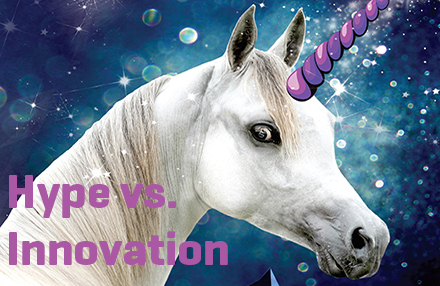Magazine: Winter 2018 | Volume 25, No. 2

The vision of this issue is to help our readers develop a more critical view of emerging technologies, to be wary of “hype” and promises of disruption, and to understand that lasting innovation is a function of time, impact, and larger societal factors.
The Winter 2018 issue of XRDS explores "fads" and "bubbles" from the past— academic and business conditions where reputation and unbounded enthusiasm were valued more than actual knowledge, impact, and tangible outcomes—as well as more recent hype, such as “unicorns” and “super unicorns”— technology start-ups that are seemingly highly valued (billions). Are they really valuable? Why or why not? And who decides? Our contributing authors express a healthy excitement and optimism for technology vs. destructive hype— one that leads to wasted time and financial pain.
But perhaps an even more important role of this Issue is to equip readers with critical perspectives toward innovation. Fads and hype come and go (as has been happening throughout history), but true innovation is long lasting. After reading this issue, we hope you will be able to sift through the noise and e skeptical about promises of the future. When we, computer scientists, better understand why hype happens and under what conditions it is beneficial, we can learn to become more grounded and truthful arbiters of the future we create.
Download
- Digital Edition web-based magazine available for subscribers – sign in
- PDF via ACM’s Digital Library
DEPARTMENT: Blogs
A world full of emojis
The XRDS blog highlights a range of topics from conference coverage, to security and privacy, to CS theory. Selected blog posts, edited for print, are featured in every issue. Please visit xrds.acm.org/blog to read each post in its entirety. If you are interested in joining as a student blogger, please contact us.
By Maria Gaci
SECTION: Features
Giving birth to touch devices
A finger swipe to control your device---what could be simpler? Yet bringing that simple concept to commercial success was anything but simple. Here's a story for those who seek to make an impact.
By George E. Gerpheide
Considering social factors in new technologies
New technologies that alter how we interact with other people come and go, creating new opportunities but also upending social norms. How should builders of new technologies consider the social implications of their systems?
By Amy X. Zhang
Why digital systems do not reach their full potential in organizations
The continuous evolution of digital systems shaping the workplace and the optimizing of work processes is revolutionary. But despite decades of accumulated experience, there are still plenty of projects that fail completely or deliver unexpected and unacceptable results. This article discusses why problems with the digitalization of working life persist.
By Bent Sandblad, Thomas Lind
The benchtop human
The artificial creation of human skin, tissue, and internal organs may sound like a futuristic dream but, incredibly, much of it is happening right now. In research facilities and hospitals around the world, scientists and medical researchers are using scanners and printers, traditionally reserved for auto design, model building, and product prototyping, to develop completely personalized treatments.
By Siddharth Kumar Sah, Soumya Jindal
Artificial intelligence technologies: Eight viewpoints
Every year, the ACM Special Interest Group on Artificial Intelligence sponsors a student essay writing contest. This article presents a clear perspective on last year's winners, which represent a diverse collection of opinions on artificial intelligence.
By Johanna Schacht
Promises of the virtual museum
Have we escaped the hype and death cycles that have plagued the history of virtual reality? In the last few years, as commercial virtual reality headsets and systems have become accessible, content developers, film festivals, and---most intriguing---galleries and museums are dipping their toes in the virtual pool.
By Jas Brooks
DEPARTMENT: Labz
Personalizing health care
Hugh Kaul Personalized Medicine Institute, University of Alabama Birmingham
Hugh Kaul personalized medicine institute, University of Alabama Birmingham
By Sepideh Maleki















